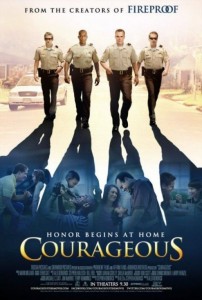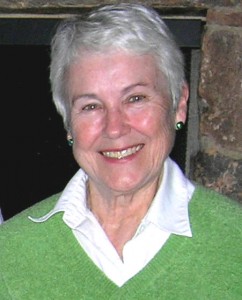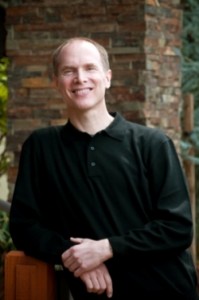Christian
Finally, as President Obama has announced, this American war will soon be over, with most of the 44,000 American troops still in Iraq coming home in time to be with their families for Christmas.
The initial feelings that rushed over me after hearing the White House announcement were of deep relief. But then they turned to deep sadness over the terrible cost of a war that was, from the beginning, wrong; intellectually, politically, strategically and, above all, morally wrong.
The War in Iraq was fundamentally a war of choice, and it was the wrong choice.
The reason the word Evangelical has become so poisonous is because the answer to the above question comes from a conversion-based model of cultural engagement - political, theological and social. Too many Christians believe, and have wrongly been taught, that those "others" and "opposites" who have made an active choice not to believe in "our" teachings are justifiably: 1) left to their own devices as we wash our hands of them because of their bad choice (think in terms of blood-on-their-own-head); or 2) uninformed, so much so that their "no" is an illegitimate answer.
Evangelicals care more about positions -- whether progressive or conservative -- than people. We lack nuance. We have become either all Scripture or all Justice. I don't know where the balance was lost in terms of holding Scripture in high authority and, simultaneously, loving with reckless abandon?
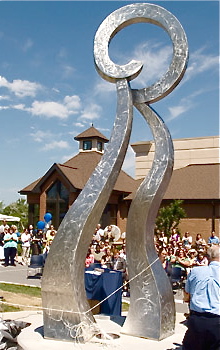
Our moral strength as a society comes from how we treat vulnerable populations. The rise of programs such as Medicaid and Head Start has allowed the independent living movement among those with disabilities to flourish and groups such as Heritage Christian Services do their life-changing work
But here's the problem: Heritage Christian Services just saw their funding cut by the federal government and they are concerned that worst of the cuts are yet to come.
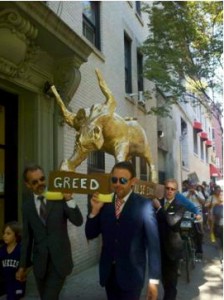 Editor’s Note: In light of the recent protests at #OccupyWallStreet and around the world, we have revisited Jim Wallis’ 2010 book Rediscovering Values: On Wall Street, Main Street, and Your Street and picked out some passages that are particularly pertinent to what we are seeing in our nation today.
Editor’s Note: In light of the recent protests at #OccupyWallStreet and around the world, we have revisited Jim Wallis’ 2010 book Rediscovering Values: On Wall Street, Main Street, and Your Street and picked out some passages that are particularly pertinent to what we are seeing in our nation today.
The Passover of the Jews was near, and Jesus went up to Jerusalem. In the temple he found people selling cattle, sheep, and doves, and the money changers seated at their tables. Making a whip of cords, he drove all of them out of the temple, both the sheep and the cattle. He also poured out the coins of the money changers and overturned their tables. He told those who were selling the doves, “Take these things out of here! Stop making my Father’s house a marketplace!” His disciples remembered that it was written, “Zeal for your house will consume me.”
– John 2:13-17
Interestingly, in his turning over of tables, Jesus specifically targeted the merchants who were selling doves. Doves were the least expensive sacrifice permitted to be offered in the temple, and, therefore, were often bought by the poorest of the pilgrims.
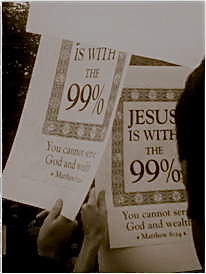
[When Jesus turns over the tables] we see a man enraged at injustice and passionately confronting those who exploit the poor. We also learn that there are some things that we all should get angry about, that there are situations where the only appropriate response is confrontation…
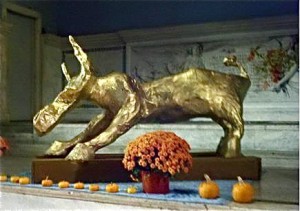 First, we were sold a lie. We were sold an illusion that promised the American Dream was as close as our next purchase. That we could pursue our selfish interests without thought to the consequences, because the “invisible hand” would work it all out in the end. We were told that we did not need to work for wealth, that it would come if only we put our money in the hands of the right stock broker, mutual fund, or stock…
First, we were sold a lie. We were sold an illusion that promised the American Dream was as close as our next purchase. That we could pursue our selfish interests without thought to the consequences, because the “invisible hand” would work it all out in the end. We were told that we did not need to work for wealth, that it would come if only we put our money in the hands of the right stock broker, mutual fund, or stock…
Second, the rules of the game failed. It was supposed to be simple. Work hard, get ahead, buy a home, and tuck some money away for the future in a 401(k). If you followed those rules, everything would work in your favor. But good jobs have disappeared, wages have been garnished, and 401(k) savings have disappeared. The rules of the game seem to have worked for those who set the rules, but not for those who played by them.
Third, our good was supposed to trickle down. We were promised that as the rich got richer, the rest of the country would prosper as well. If we handed our finances and ultimately our lives over to those who knew the market the best, it would benefit us all. If we took the virtues of the market and made them the virtues of our lives, we, too, would experience boundless prosperity. Fulfillment would come if we could just trust the market enough to work for us…
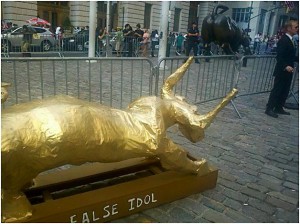 The market has become our “golden calf,” our idol of ultimate allegiance… This is when God—and then Moses—got angry. Why? Just because they built a golden calf? No. The calf could have been just a work of art, a statue to enjoy. What made the calf an idol was that the people gave the newly created calf the credit for leading them out of Egypt. They gave to the golden calf credit and attributes that belong only to God…
The market has become our “golden calf,” our idol of ultimate allegiance… This is when God—and then Moses—got angry. Why? Just because they built a golden calf? No. The calf could have been just a work of art, a statue to enjoy. What made the calf an idol was that the people gave the newly created calf the credit for leading them out of Egypt. They gave to the golden calf credit and attributes that belong only to God…
Today, instead of statues, we have hedge funds, mortgage- backed securities, 401(k)s, and mutual funds. We place blind faith in the hope that the stock indexes will just keep rising and real estate prices keep climbing. Market mechanisms were supposed to distribute risk so well that those who were reckless would never see the consequences of their actions. Trust, security, and hope in the future were all as close to us as the nearest financial planner’s office. Life and the world around us could all be explained with just the right market lens. These idols were supposed to make us happy and secure and provide for all our needs. Those who manage them became the leaders to whom we looked, not just for financial leadership, but direction for our entire lives. That is idolatry.
Rich and poor alike were sucked into making heroes out of those who seemed to be able to turn everything they touched into gold. Holocaust survivor and Nobel Peace Prize recipient Elie Wiesel lost virtually all of his personal wealth and his foundation’s, up to $37 million, to Bernie Madoffs Ponzi scheme. “We gave him everything, we thought he was God, we trusted everything in his hands.”‘
(All pictures are courtesy of Catholics United, who produced the ‘golden calf’. Extracts come from pages 19-29 of the hardcover edition of Rediscovering Values.)
Interfaith Worker Justice has published a Prayer Service designed to help people reflect on a moral economy within the context of their religious tradition. Written for clergy and religious leaders, the prayer service is aimed for those Occupying Wall Street and other cities, and for congregational use.
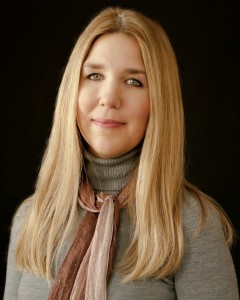
Evangelicals had always seemed like the "other" Christians. They were the ones who didn't celebrate Advent or baptize babies. They were the ones who went colleges that required pledges not to drink, smoke or dance. They were the ones who frowned upon evolution or "free-thinking."
As a child of the 1970s and '80s, I saw evangelicals as politically and socially conservative -- ever skeptical of culture and worried about what we were reading and watching. They bobbed for apples at "Harvest" parties instead of trick-or-treating on Halloween. They were the ones telling Kevin Bacon he couldn't be footloose and fancy free -- or maybe those were "fundamentalists." Did it matter? Was there even a difference?
This was not so much a movie as a (very long) sermon. In fact, it's a sermon that actually culminates in a sermon, as Kendrick's character spells out what he has learned in a message delivered to his church congregation.
Despite its well-meaning intentions, Courageous fails to say anything new about fatherhood, family, faith or anything else, for that matter. The few funny or moving scenes are surrounded by clunky acting, overly-moralistic dialogue and a plot that is trying to be three movies in one -- and none of them terribly believable.
The "sermon" consisted of reflections by five participants from different regions and traditions who were attending the Global Christian Forum for the first time. They each spoke of the joy, and often the surprise, in what they discovered here -- some of them interacting with delegates from Christian traditions they barely knew even existed.
The unity of heart and Spirit they experienced at the forum had a profound effect, they said. Emily Obwaka of Kenya, a staff member from the Association of Evangelicals in Africa, whom I met on the bus the first day of the forum, was one of those who shared. She said the forum felt like "a preamble to heaven." Such sentiments might seem excessive but they were not uncommon among the 287 forum participants from 65 countries. Joy and affirmation were among the greatest takeaways from the five-day gathering.
Albania was perhaps the most closed society in the world during the Cold War, with absolutely ruthless persecution of all religion. Churches were destroyed in every corner of that country. Clergy were eliminated. Worship was outlawed. And enforcement was brutal.
When Communism fell, and the country opened for the first time in decades, the Albanian church began a miraculous process of rebirth. We heard the moving story of the Albania Orthodox Church, rebuilding countless church structures, but even more importantly, restoring faith in the hearts of its people. I've known its leader, Archbishop Anastasios, from past encounters at the World Council of Churches, and he surely is a saint. The revival of religious faith in Albania and its compassionate service to those in need is a magnificent story of the church's witness, and the Spirit's power.
As Christians we have a decision to make. In times of hopelessness and long periods of waiting for things to get better, will we let ourselves be cast into the all-consuming fires of idolatry?
Or, will we stand up against the false gods and catch the flame of the Spirit in our hearts and minds?
Our nation may very well be on the threshold of a crucial change. Who will you be standing with?
As we waste time fanning capitalism's raging inferno, the best parts of ourselves remain frozen.
The Christian world is broad and spacious, and within its circumference, like a large bowl holding a variety of colorful fish, swim a surprisingly diverse spectrum of believers. The secular media mistakenly seem to view "the evangelical movement" as a sort of monolithic structure akin to a well fortified garrison ranged to repel the attacks of "liberals" or "progressives" or "mainline churches." Or a right-wing political force often equated with Republicanism.
The atlas also documents other dramatic trends, including the fragmentation of Christianity. New denominations, often borne out of strife and division, multiply endlessly. In Korea, for instance, there are now 69 different Presbyterian denominations. At the rate we are going, by 2025 there will be 55,000 separate denominations in the world!
That is an utter mess fueled by rivalry and confusion that hampers the church's witness and makes a mockery of God's call to live as parts of one body.
The atlas also documents the dramatic rise of revival movements throughout the world, and charts the story of Pentecostalism's rise. From its beginning a century ago, Pentecostalism now comprises a quarter of all Christians in the world. This fundamental change in Christianity's global composition, along with its geographical transformation, has created a dramatically different Christian footprint in the world.
The compelling story of the Global Christian Forum, shared with the more than 300 forum attendees (many of them new), was told in moving testimonies from Orthodox, Pentecostal, Evangelical, Catholic, and historic Protestant members of the forum's steering committee. ... It's remarkable to hear how an Egyptian surgeon became a Coptic Orthodox priest, or how a woman Anglican Bishop from New Zeland heard her calling to the priesthood as a teenager, long before her church ordained women. Story after story simply puts you in awe of God's grace.
USA Today's religion reporter Cathy Lynn Grossman has a great post this morning looking at coverage of the spiritual import of the #OccupyWallStreet protests from the perspective of several religious commentators, including Catholic writer/professor Tom Beaudoin and Jewish writer/actor Jake Goodman.
As the evangelical community in Portland rediscovered the calling of showing, in addition to sharing their faith, everything has changed. And it's only the beginning of what God is doing in our city. We're in it for the long-haul.
Not only have many great needs been met, but churches are working together in relationship as never before. The impact of one church humbly serving is profound. But the impact of a united Church serving in concert, actually has the power to change how the world views the Gospel.
The Global Christian Forum is the most exciting and promising ecumenical initiative I've participated in all my years of ministry. Its import can be summed up simply: This is the only place where the leadership of evangelical, Pentecostal, Catholic, historic Protestant and Orthodox churches -- which comprise all the major "families" of world Christianity -- are brought into sustained and intentional fellowship. In so doing, the Global Christian Forum is also responding to the dramatic shift of the center of Christianity from the North and West to the southern hemisphere.
Increasingly, in meetings focused on a wide variety of human tragedies, I hear these words: "What are you doing here? I didn't think evangelicals cared about these things."
I understand those comments. I grew up in a form of Christianity in which "saving souls" was pretty much all that mattered. The God I discovered in that church was a harsh, demanding tyrant; I knew that if I wanted to earn God's love I would have to be very good, follow all the rules, and work very hard. As a devout adolescent I did that. As a young pastor's wife I did that.
Unfortunately, I worked a little too hard and eventually became utterly exhausted, seriously depressed, and physically sick. That plunged me into a total life crisis in which I felt compelled to give up the God of my childhood.
Fortunately, a wise friend said to me, "For a while, forget everything you've ever thought about Christianity; forget the Old Testament; forget Paul and the epistles-and just read Jesus."
So for months -- for years actually -- I just read Jesus. And slowly but surely, Jesus reshaped my understanding of what it meant to be a Christian.


